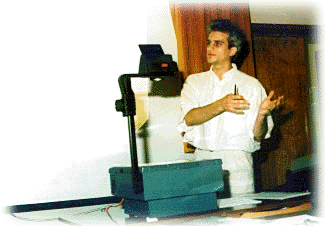CENTER FOR COGNITIVE SCIENCE

GRADUATE PROGRAM IN


The purpose of the Preparatory Program is to involve the students in the interdiscipli-nary spirit of cognitive science, and to give them minimal knowledge in each of the contributing disciplines independently of the student's background study and specific fields of interest as well as to equip them with sound and interdisciplinary research methodology. Part of these prerequisites can be fulfilled within the students' Bachelor program (e.g. in the NBU's Undergraduate Program in Psychology). It is not expected, however, that there will be students who have already covered all that material, as each is coming from a particular major.
Required Courses: COG309 Experimental Psychology
(2) COG400 Foundations of Cognitive Science (2)
COG500 Readings in Cognitive Science Seminar (2)
The Readings Seminar envisages students to go carefully through some original research
work in Cognitive Science and present it in oral and written form at the seminar. This is
followed by a tutor-led or student-led discussion about the strong and weak points of the
work. COG599 Scientific Writing and Presentation in
English (2) COG690 Summer School (1-12)
A Summer School (which is part of the graduate program) is organized annually with the
participation of foreign lecturers who will be members of the International Advisory Board
or Professors invited by them. The School's program consists of short intensive courses,
tutorials, seminar discussions, panel discussions, student research seminars, project and
group work, theses defense. Students can receive credits for particular course taken
during the Summer School.
Restricted Electives: at least 3 units in Cognitive Modeling:
COG401 Symbolic Modeling (3) COG402 Connectionist Modeling (3)
Restricted Electives: minimum 6 units in Cognitive Psychology:
COG311 Perception (2) COG330 Learning and Memory (2) COG460 Thinking, Reasoning and Problem Solving (2) COG461 Decision Making (2) COG462 Cognitive Development
(2)
Restricted Electives: at least 2 units in Cognitive
Linguistics: COG105 Introduction to
Linguistics (2) COG415 Psycholinguistics (2)
Restricted Electives: at least 3 units in Neurosciences:
COG417 Neuropsychology of Higher Cognitive Functions (3) COG418
Neurophysiology and Senses (3)
Restricted Electives: at least 2 units in Philosophy:
COG422 Philosophy of Mind (2) COG423 Epistemology (2)
Restricted Electives: at least 10 units in Methods of
Cognitive Science: at least 2 units in: COG310
Psychophysics (2) PSY201 Psychological Measurement
(2) COG463 Technology Psychophysiological Experiment (2) COG540 Protocol Analysis (2)
at least 4 units in: COG376 Advanced Statistics: Statistical Inference (2) COG377 Advanced
Statistics: Analysis of a Nonmetric Data (2) COG481 Advanced Statistics: Multivariate
Analysis (2)
at least 2 units in: COG404 Simulation Models Lab (2) COG480 AI Programming in LISP (2)
COG499 Integration Project (5): Students write a review of the literature on a
topic pulling together theories and data from all contributing disciplines (included in a
course).
The Comprehensive Examination tests the knowledge and skills acquired at the preparatory phase. Based on its results the student may continue his or her study. Students with a relevant bachelor’s degree at NBU or its equivalent may sit directly for the comprehensive examination without doing the preparatory phase.
Within this program the student concentrates on his/her field of interest and masters his/her research skills. It is required that the students form their own individual program on a problem base (like perception, reasoning) rather than on a discipline base (like cognitive psychology, neuroscience). Each student should complete some research work and write a Master's Thesis. The students also assist in undergraduate teaching.
Required Courses: COG400 Foundations of Cognitive
Science (3) COG690 Summer School (1-12)
A Summer School (which is part of the graduate program) is organized annually with the
participation of foreign lecturers who will be members of the International Advisory Board
or Professors invited by them. The School's program consists of short intensive courses,
tutorials, seminar discussions, panel discussions, student research seminars, project and
group work, theses defense. Students can receive credits for particular course taken
during the Summer School.
Graduate Courses: COG408 Theories of Language
Aquisition (3) COG421 History of the Cognitive
Revolution (3) COG424 Philosophy of Language (3) COG440
Cognitive Linguistics (3) COG501 The Phenomenon of
Analogy and the Possibilities for its Modeling (3) COG503
Integration of the Symbolic and Connectionist Approaches (3) COG504 Planning (3) COG505
Seminar in Psycholinguistics (3) COG506 Machine
Learning (3) COG511 Visual Information Processing
(3) COG512 High-Level Vision (3) COG521 Mind and
Consciousness (3) COG555 Functional Cerebral
Asymmetry (3) COG556 Neuropsychology of Perception
and Imagery (3) COG557 Neuropsychology of Language (3) COG559 Neuro-Psychopharmacology (3) COG560 Brain Electrical Signals Related to Cognitive
Processes (3) APL640 Schools and Methods in Antropology
Required Special Studies: COG610 Graduate Research Seminar (3)
This seminar provides the students with the opportunity to present publicly their
re-search work, their current plans and results, to hold group discussions and to receive
feedback and alternative ideas. COG650 Research Project (5)
Intensive, active research on a topic selected by the student and adviser. The student
does a thorough analysis of the problem and of the research literature; carries out new,
original studies; prepares a formal report of publishable quality. COG660 Teaching
Practice in Cognitive Science (5)
MSc Students assist the faculty in teaching undergraduates by advising them in their
individual program design, by organizing weekly tutorials, by evaluating homework, etc.
COG699 Master Thesis (15)
The Master of Science Thesis may be either basic or applied research. For students not
willing to continue with Ph.D. studies it is strongly recommended to choose an applied
problem (from education - testing, reading, second language learning, teaching
mathematical skills; design; human factors in information systems; medi-cine; marketing;
decision making; visual arts; human-computer interaction; etc.) in order to prepare
themselves for professional work.
Supervision:
Students are encouraged to propose potential supervisors and area of specialization.
Supervisors are appointed by the Program Director. This is done immediately after the
successful passing of the integration project.
MSC. Thesis Committee:
A 3 to 5 member Thesis Committee is appointed for each student. The Committee includes the
student's advisor, members of the Department with related fields of study and one
international reviewer at least. The Members of the Thesis Committee should have different
professional backgrounds.
Thesis Project:
The students present their thesis projects to their Thesis Committees at the beginning of
research and the Committee members discuss the significance and complexity of the project
aims as well as the relevance of the methods chosen. The Committee helps the students in
formulating the main goals, possible methods, and outcomes of the project. The Thesis
Committee fixes the title and the task of the Thesis. These could be changed by the
Committee in the course of time for various reasons. The topic of the Thesis should be
related to the ongoing research at NBU. The Thesis project should involve experimental
research, it cannot be speculative.
Public Defense:
The Thesis has to be written in English. Students present their theses before the Thesis
Committee (with an audience of faculty members and students) usually during the Summer
School which will secure an international audience of the defense. Each member of the
Thesis Committee writes a critical review of the thesis and the Committee makes its
decision on the bases of these reviews and of the successful public presentation.
Admission:
Students are recommended for Ph.D. study by their MSc. Thesis Committee. Candidates must
have a Bachelor Degree in Psychology, Computer Science, Linguistics, Biology, Medicine,
Philosophy or other related disciplines (as determined by the Department on a case-by-case
procedure). Candidates must have a very good command of English. The admission procedure
includes writing a Statement of Purpose, an Essay, and an Interview. Foreign students are
admitted to the Program and teaching is in English (very good command of English is
expected from the candidates).
Note: Admission to the Ph.D. Program is only through the preparatory and Master of
Science program track. There is no admission directly to the PhD program. Therefore the
duration of study is 4 years (2 of which in the preparatory and Master phases).
Required Courses:
COG690 Summer School (1-12)
A Summer School (which is part of the graduate program) is organized annually with the
participation of foreign lecturers who will be members of the International Advisory Board
or Professors invited by them. The School's program consists of short intensive courses,
tutorials, seminar discussions, panel discussions, student research seminars, project and
group work, theses defense. Students can receive credits for particular course taken
during the Summer School.
Graduate Courses:
Ph.D. students take additional graduate courses of their own choice from the Graduate and
Preparatory Courses set. 20 units are required in addition to the courses taken within the
Master Program. COG700 Directed Individual Study (3)
Offers an opportunity for studying of graduate level topics related to Cognitive Science
but not included elsewhere in the curriculum. Normally used for individual study and
research, under the supervision of a faculty member, of topics of mutual interest to
student and supervisor. COG701 Directed Group Study (3)
Offers an opportunity for group study of advanced subjects related to Cognitive Science
not otherwise included in the curriculum. Usually under the format of tutorial study and
research inspecialized topics agreed between a faculty member and a group of at least
three students. COG760 Teaching in Cognitive Science (10)
Ph.D. students should gain teaching experience. They advise MSc. Students in individual
program design, organize weekly tutorials for both undergraduate and MSc. Students;
evaluate homeworks and projects; assist in classroom teaching under the supervision of a
faculty member.
Research:
COG750 Research Project (10)
The research topics of current interest at the Department include: Hybrid Cognitive
Architectures (Integration of Symbolic and Connectionist Approaches). Models of Human
Reasoning and of Analogy-Making in particular, with an emphasis on its dynamic and
context-dependent nature. Context Effects on High-Level Cognitive Processes Models of
Human Decision Making. Simulation of Social Behavior (Multi-Agent Systems). Mechanisms of
Motion Perception and Localization. Individual Differences in Perception. Individual
Differences in Lateralization of Functions. Interaction between Perception and Imagery.
Cross-Linguistic Studies of Aphasia. New Learning Strategies. Cognitive Approach to
Testing.
Supervision:
Students are encouraged to propose potential supervisors and area of specialization.
Supervisors are appointed by the Program Director. This is done immediately after the
successful passing of the integration project.
 Dissertation Committee:
Dissertation Committee:
A 5 to 7 member Dissertation Committee is appointed for each student. The Committee
includes the student advisors, members of the Department with related fields of study and
at least two international reviewers (members of the International Advisory Board or
persons recommended by them).
Dissertation Project:
The Ph.D. students present their dissertation projects before their Dissertation
Committees at the beginning of the research and the Committee members discuss the
significance and complexity of the project aims as well as the relevance of the meth-ods
chosen. The Committee helps the students in formulating the main goals, the possible
methods, and the outcomes of the project. The Dissertation Committee fixes the title and
the task of the Thesis. These could be changed by the Committee in the course of time for
various reasons. The topic of the Thesis should be related to the ongoing research at NBU.
The thesis project should involve experimental research, it cannot be speculative. It
should involve the application of at least two different methods of study: simulation
experiment psychological experiment neuroscience experiment linguistic analysis
philosophical analysis computational analysis
| Public Defense: The Ph.D. students present their theses before the Dissertation Committee (with an audience of faculty members and students) usually during the Summer School which will secure an international audience of the defense. Each member of the Thesis Committee writes a critical review of the thesis and the Committee makes its decision on the bases of these reviews and of the successful public presentation. |  |